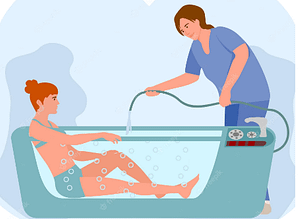Naturopathy – ಪ್ರಕೃತಿ ಚಿಕಿತ್ಸೆ
Naturopathy is a form of alternative medicine that emphasizes the use of natural remedies and therapies to promote wellness and treat illness. It is based on the belief that the body has an innate ability to heal itself and that nature provides the necessary resources for this healing process. Naturopathic treatments may include herbal remedies, dietary changes, massage, acupuncture, and lifestyle modifications. While some naturopathic practices have a scientific basis, others are not supported by evidence and should be approached with caution.
Types of treatment in naturopathy
Naturopathy utilizes a variety of natural treatments and therapies, some of the most common ones are:
Herbal medicine: The use of plants and their extracts for healing and wellness.
Dietary changes: Recommendations for specific diets, such as a whole food or plant-based diet, to promote health and prevent disease.
Hydrotherapy: The use of water, such as hot and cold compresses, baths, and showers, to stimulate the body’s natural healing processes.

Massage therapy: The use of touch and pressure to manipulate the soft tissues of the body to relieve pain and promote relaxation.

Acupuncture: A form of traditional Chinese medicine that involves the insertion of needles into specific points on the body to stimulate the flow of energy.
Lifestyle modifications: Recommendations for changes in habits and activities, such as exercise, stress management, and sleep patterns, to promote health and prevent disease.
Homeopathy: A system of medicine based on the principle of “like cures like,” using very dilute amounts of natural substances to stimulate the body’s healing processes.
It’s important to note that not all forms of naturopathy are based on scientific evidence, and some may not be safe or effective. Consultation with a qualified health professional is recommended before trying any alternative therapies.
Courses in naturopathy
Naturopathy is a growing field, and there are several education and training programs available for individuals who want to become naturopathic practitioners. Some common courses in naturopathy include:
Anatomy and Physiology: A study of the structure and function of the human body.
Clinical Nutrition: The study of the role of food and nutrition in promoting health and preventing disease.
Herbal Medicine: The study of the use of plants and their extracts for healing and wellness.
Homeopathy: A study of the principles and practices of homeopathic medicine.
Naturopathic Diagnosis: The study of methods for diagnosing illness and determining the best course of treatment.
Acupuncture: A study of the principles and practices of acupuncture and traditional Chinese medicine.
Massage Therapy: A study of the techniques and principles of massage therapy.
Naturopathic Philosophy and Ethics: A study of the philosophical and ethical foundations of naturopathy.
These courses may be taken as part of a larger program leading to a degree in naturopathy(BNYS), or as individual courses for continuing education. The curriculum and accreditation of naturopathy programs may vary, so it’s important to do your research and choose a reputable program.

